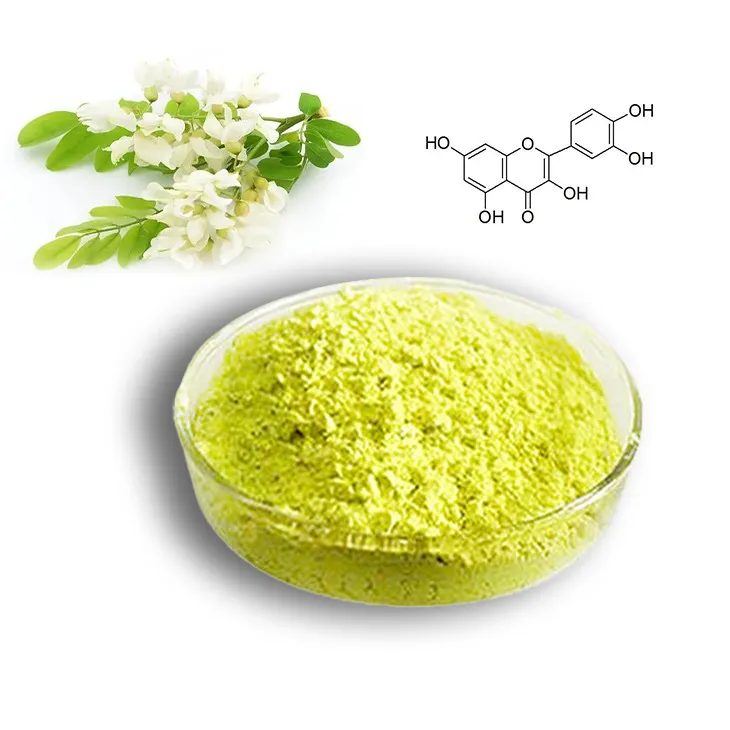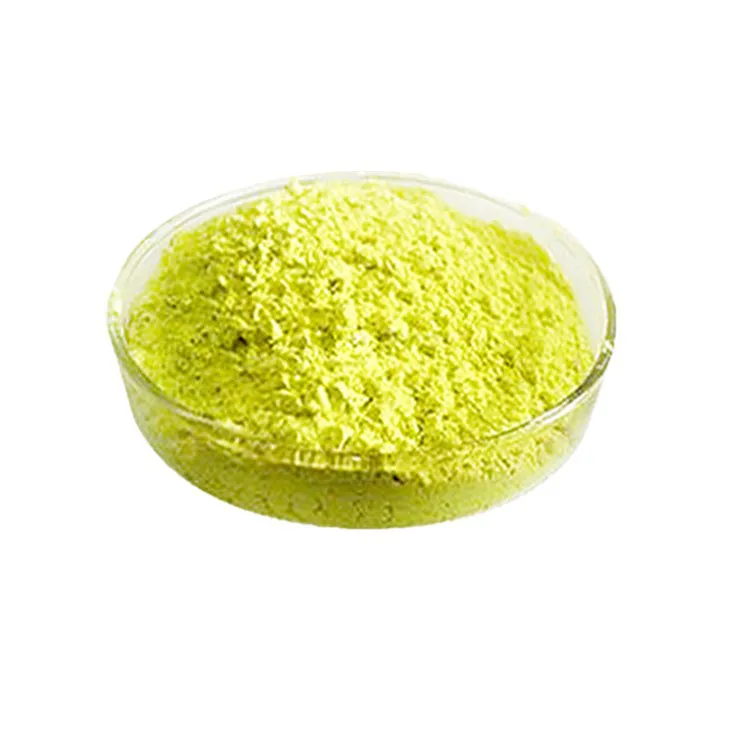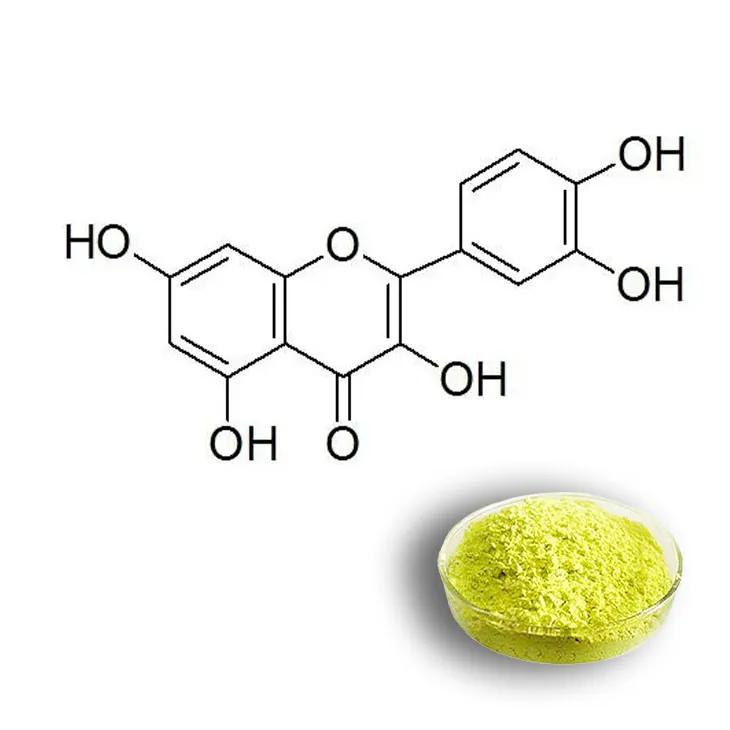- 0086-571-85302990
- sales@greenskybio.com
Seven Trends of Quercetin.
2024-12-21

1. Quercetin in the Wellness Industry
Quercetin is currently making waves in the wellness industry. It is being recognized as a natural remedy with a host of beneficial properties. One of the most significant aspects is its antioxidant property. Antioxidants play a crucial role in the body by neutralizing free radicals. Free radicals are unstable molecules that can cause damage to cells, leading to various health problems such as premature aging, heart disease, and certain types of cancer. Quercetin's antioxidant ability helps to counteract the harmful effects of these free radicals, thus promoting overall health.
Another important property of quercetin in the wellness context is its anti - inflammatory effect. Inflammation is a natural response of the body's immune system to injury or infection. However, chronic inflammation can be a root cause of many diseases, including autoimmune disorders, arthritis, and even some neurodegenerative diseases. Quercetin helps to reduce inflammation by modulating the body's immune response. It can inhibit the production of certain inflammatory mediators, such as cytokines and prostaglandins, which are involved in the inflammatory process.
Furthermore, quercetin has shown antiviral potential. In the face of the ongoing global health challenges, substances with antiviral properties are highly sought after. Quercetin has been studied for its ability to interfere with the replication cycle of viruses. It may act on different stages of the viral life cycle, from preventing the virus from attaching to host cells to inhibiting its replication within the cells. This makes it a promising candidate for natural antiviral therapies in the wellness industry.

2. Quercetin in Cosmetics
The use of quercetin in the cosmetics industry is on an upward trend. One of the main reasons for this is its role in collagen production. Collagen is a key protein in the skin that provides structure and elasticity. As we age, collagen production naturally declines, leading to the appearance of wrinkles, sagging skin, and loss of firmness. Quercetin has been found to stimulate the production of collagen in the skin cells, which can help to improve the skin's texture and reduce the signs of aging.
Quercetin also contributes to skin brightening. It can inhibit the activity of an enzyme called tyrosinase, which is involved in the production of melanin. Melanin is the pigment responsible for skin color, and excessive melanin production can lead to hyperpigmentation, such as dark spots and uneven skin tone. By inhibiting tyrosinase, quercetin can help to lighten the skin and even out the skin tone, giving the skin a more radiant and youthful appearance.

3. Quercetin in the Study of Metabolic Syndrome
A new trend is emerging in the study of metabolic syndrome, where quercetin may hold great potential. Metabolic syndrome is a cluster of conditions that include abdominal obesity, high blood pressure, high blood sugar, and abnormal lipid levels. These conditions increase the risk of developing heart disease, stroke, and type 2 diabetes.
Quercetin may be beneficial in regulating metabolism. It has been shown to influence various metabolic pathways in the body. For example, it can improve insulin sensitivity, which is crucial for maintaining normal blood sugar levels. Insulin is a hormone that regulates the uptake and utilization of glucose by cells. When insulin sensitivity is low, cells do not respond properly to insulin, leading to high blood sugar levels. Quercetin can enhance the action of insulin, allowing cells to take up glucose more effectively, thus helping to control blood sugar levels.
Moreover, quercetin can also affect lipid metabolism. It has the potential to lower levels of bad cholesterol (LDL - cholesterol) and triglycerides, while increasing levels of good cholesterol (HDL - cholesterol). This lipid - modulating effect can contribute to a healthier lipid profile and reduce the risk of cardiovascular diseases associated with metabolic syndrome.

4. Quercetin in the Dietary Supplement Market
In the dietary supplement market, quercetin - based products are becoming increasingly popular for immune support. The immune system is our body's defense against infections and diseases. A strong immune system is essential for maintaining good health.
Quercetin has been shown to enhance the function of the immune system in several ways. It can stimulate the production and activity of immune cells, such as white blood cells. These cells play a crucial role in identifying and eliminating foreign invaders, such as bacteria, viruses, and fungi. By boosting the immune system, quercetin - based supplements can help the body to better resist infections and recover more quickly from illness.
Furthermore, quercetin's antioxidant and anti - inflammatory properties also contribute to its immune - enhancing effects. By reducing oxidative stress and inflammation in the body, it creates a more favorable environment for the immune system to function optimally.

5. Quercetin in the Field of Ophthalmology
Research on quercetin's potential to protect eyesight is a growing trend in the field of ophthalmology. The eyes are complex organs that are constantly exposed to various environmental factors and oxidative stress.
Quercetin's antioxidant properties are particularly beneficial for eye health. The retina, which is responsible for detecting light and transmitting visual signals, is highly vulnerable to oxidative damage. Free radicals can cause damage to the cells in the retina, leading to vision problems such as macular degeneration and cataracts. Quercetin can scavenge free radicals in the eyes, protecting the retinal cells from oxidative damage and potentially reducing the risk of these eye diseases.
In addition, quercetin may also have a role in maintaining the normal function of the eye's blood vessels. Good blood circulation is essential for delivering oxygen and nutrients to the eye tissues. Quercetin can help to improve blood vessel function, ensuring proper blood supply to the eyes and promoting overall eye health.
6. Quercetin in the Development of New Anti - Allergic Medications
Another emerging trend is the use of quercetin in the development of new anti - allergic medications. Allergies are a common health problem that can cause a range of symptoms, from mild itching and sneezing to severe anaphylactic shock.
Quercetin has anti - allergic properties that can be harnessed in drug development. It can inhibit the release of histamine from mast cells. Histamine is a chemical mediator that is released during an allergic reaction and is responsible for many of the symptoms associated with allergies, such as itching, swelling, and redness. By blocking the release of histamine, quercetin can potentially reduce the severity of allergic reactions.
Moreover, quercetin can also modulate the immune response in allergies. It can regulate the activity of immune cells involved in the allergic response, such as T - cells and B - cells. This immunomodulatory effect can help to prevent the over - activation of the immune system in allergic reactions, providing a more comprehensive approach to treating allergies.
7. Quercetin in the Study of Plant - Microbe Interactions
In the study of plant - microbe interactions, quercetin is being explored as a signaling molecule, which represents the seventh trend. Plants interact with a wide variety of microbes in their environment, including bacteria, fungi, and viruses. These interactions can be either beneficial or harmful to the plants.
Quercetin has been found to play a role in plant - microbe communication. It can act as a signal that plants use to communicate with microbes. For example, plants may release quercetin into the soil to attract beneficial bacteria or fungi. These beneficial microbes can then form symbiotic relationships with the plants, such as mycorrhizal associations, which can help the plants to obtain nutrients more efficiently, enhance their resistance to diseases, and improve their overall growth and development.
On the other hand, quercetin may also be involved in the plant's defense against pathogenic microbes. It can act as a defense signal, triggering the plant's immune response when it detects the presence of harmful microbes. This can lead to the production of defense - related proteins and chemicals in the plant, which can help to fend off the invading pathogens.
FAQ:
What are the antioxidant properties of quercetin?
Quercetin is a flavonoid that has antioxidant properties. It can scavenge free radicals in the body, which are unstable molecules that can cause damage to cells. By neutralizing these free radicals, quercetin helps protect cells from oxidative stress, which is associated with various health problems such as aging, cancer, and heart disease.
How does quercetin help in skin brightening?
Quercetin can contribute to skin brightening in several ways. It has antioxidant properties that protect the skin from damage caused by free radicals, which can lead to dull skin. Additionally, it may play a role in collagen production. Collagen is important for maintaining skin elasticity and a youthful appearance. By promoting collagen synthesis, quercetin can help improve the overall texture and tone of the skin, resulting in a brighter complexion.
What is the role of quercetin in regulating metabolism in the context of metabolic syndrome?
In the study of metabolic syndrome, quercetin may be beneficial in regulating metabolism. It can influence various metabolic processes. For example, it may help improve insulin sensitivity, which is crucial for maintaining normal blood sugar levels. It can also affect lipid metabolism, potentially reducing levels of harmful lipids such as triglycerides in the blood. By modulating these metabolic pathways, quercetin may play a role in preventing or managing metabolic syndrome.
How do quercetin - based products support the immune system?
Quercetin - based products support the immune system through multiple mechanisms. Quercetin has antioxidant and anti - inflammatory properties. It can reduce oxidative stress and inflammation in the body, which are factors that can suppress the immune system. Additionally, it may enhance the function of immune cells such as lymphocytes and macrophages. These cells play important roles in fighting off infections and diseases, so by improving their function, quercetin - based products can contribute to overall immune support.
What is the evidence for quercetin's potential to protect eyesight?
Research in the field of ophthalmology has shown some evidence for quercetin's potential to protect eyesight. Quercetin has antioxidant properties that can protect the eye tissues from damage caused by free radicals. It may also have anti - inflammatory effects in the eyes. Some studies have suggested that it could be beneficial in preventing or slowing down the progression of age - related macular degeneration and cataracts, which are common eye diseases that can lead to vision loss. However, more research is still needed to fully understand its mechanisms and effectiveness in protecting eyesight.
Related literature
- Quercetin: A Promising Molecule for Health Benefits"
- "The Role of Quercetin in Skin Health and Cosmetics"
- "Quercetin and Metabolic Syndrome: Current Research"
- "Immune - Boosting Effects of Quercetin - Based Supplements"
- "Quercetin in Ophthalmology: Protecting Vision"
- ▶ Hesperidin
- ▶ citrus bioflavonoids
- ▶ plant extract
- ▶ lycopene
- ▶ Diosmin
- ▶ Grape seed extract
- ▶ Sea buckthorn Juice Powder
- ▶ Beetroot powder
- ▶ Hops Extract
- ▶ Artichoke Extract
- ▶ Reishi mushroom extract
- ▶ Astaxanthin
- ▶ Green Tea Extract
- ▶ Curcumin Extract
- ▶ Horse Chestnut Extract
- ▶ Other Problems
- ▶ Boswellia Serrata Extract
- ▶ Resveratrol Extract
- ▶ Marigold Extract
- ▶ Grape Leaf Extract
- ▶ blog3
- ▶ blog4
- ▶ blog5
-
Pure 85% Tomentil Extract.
2024-12-21
-
Sea buckthorn oil
2024-12-21
-
Artichoke Extract
2024-12-21
-
Oyster Mushroom Extract Powder
2024-12-21
-
Coix Seed Extract
2024-12-21
-
Wheat Germ Extract
2024-12-21
-
Thunder God Vine Extract
2024-12-21
-
Green coffee bean Extract
2024-12-21
-
Chaste Berry Extract
2024-12-21
-
Stevia Extract
2024-12-21
-
Hops Extract
2024-12-21





















